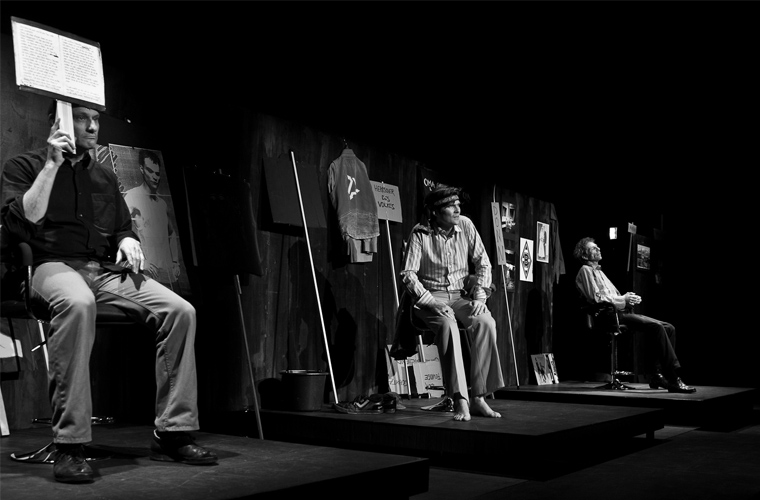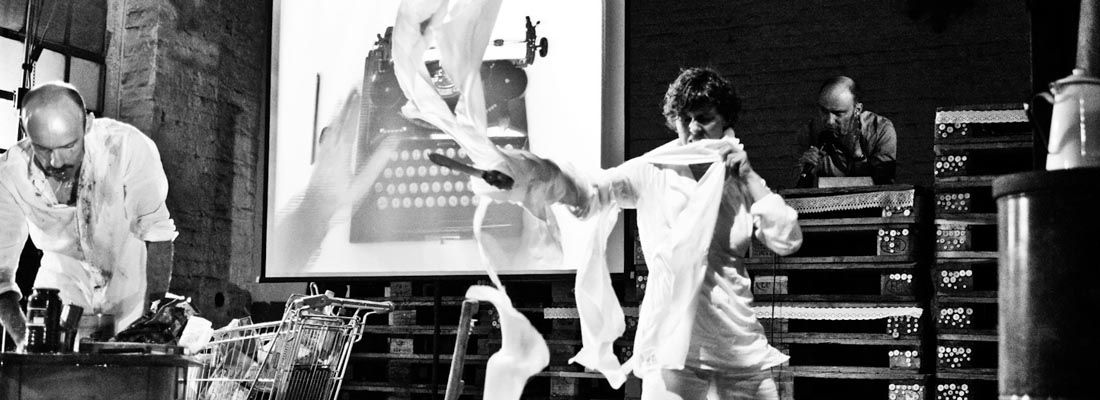Futur3 – die Geschichte eines Kollektivs
Drei Theatermacher erwarten zeitgleich Nachwuchs, und suchen einen Namen für ihre gemeinsamen Theaterprojekte – »Futur3« ist geboren, gegründet im Herbst 2003 von André Erlen, Stefan H. Kraft und Klaus Maria Zehe als Plattform für ihre Theaterarbeit in Köln. Schon mit ihren ersten Produktionen suchen sie Aufführungsorte außerhalb fester Theaterhäuser, machen die Stadt selbst zur Bühne und inszenieren oftmals mit aufwändiger Logistik auf einen bestimmten – öffentlichen oder privaten – Raum hin.
Gearbeitet wird seit je her im Kollektiv. Eine Haltung, die übrigens die Zuschauer durchaus einbezieht: gefordert ist ein aktives Publikum, das die Rollen annimmt, die ihm dramaturgisch zugedacht sind – seien es nun Delegierte einer Nahost-Friedenskonferenz oder Gäste einer Trauerfeier. Das partizipative Moment schließt ein, dass Theater auch als Ritual gefeiert wird. Gemeinsames Essen und Trinken gehören bei Futur3-Produktionen dazu. So treten Zuschauer wie Theatermacher in einen direkten Dialog über die immer auch politisch geprägten Themen von Futur3: Krieg, Arbeitslosigkeit, Obdachlosigkeit und Gentrifizierung, Utopien (wie wollen wir leben?). Aber auch Tabus, der Umgang mit Tod, Familie, Liebe, die eigene Biografie. Erlebtes, Fakten, Meinungen und Fiktion vermischen sich, wenn im Probenprozess die Kondensate der oft sehr ausführlichen Recherchephasen auf die Improvisationen der Schauspieler treffen. Häufig werden die Probenergebnisse durch die Arbeit von Autoren literarisch verdichtet.
 »Von Genen und anderen Zufällen« erzählen André Erlen, Stefan H. Kraft und Klaus Maria Zehe
»Von Genen und anderen Zufällen« erzählen André Erlen, Stefan H. Kraft und Klaus Maria Zehe
Futur3 sucht nicht nur eine transdiziplinäre Zusammenarbeit mit Autoren, Musikern, Tänzern, mit Wissenschaftlern, Streetworkern und Bestattern, sondern ebenso die Internationalität: Arbeitskontakte, Festivaleinladungen und Koproduktionen mit Theaterkünstlern in der Ukraine, Polen, USA, Italien, Israel, Singapur, Schweiz und Belgien haben die Arbeiten der letzten Jahre bereichert.
Formal denkt Futur3 das Theater beständig weiter, stellt es in Frage und erfindet es als theatrales Happening oder begehbare Installation neu. Der Dialektik aus Spielen und Zuschauen im Moment der Performance werden diskursive Formate an die Seite gestellt, die das Theater zu einem nicht nur ästhetischen Ort gesellschaftlicher Auseinandersetzung machen.
